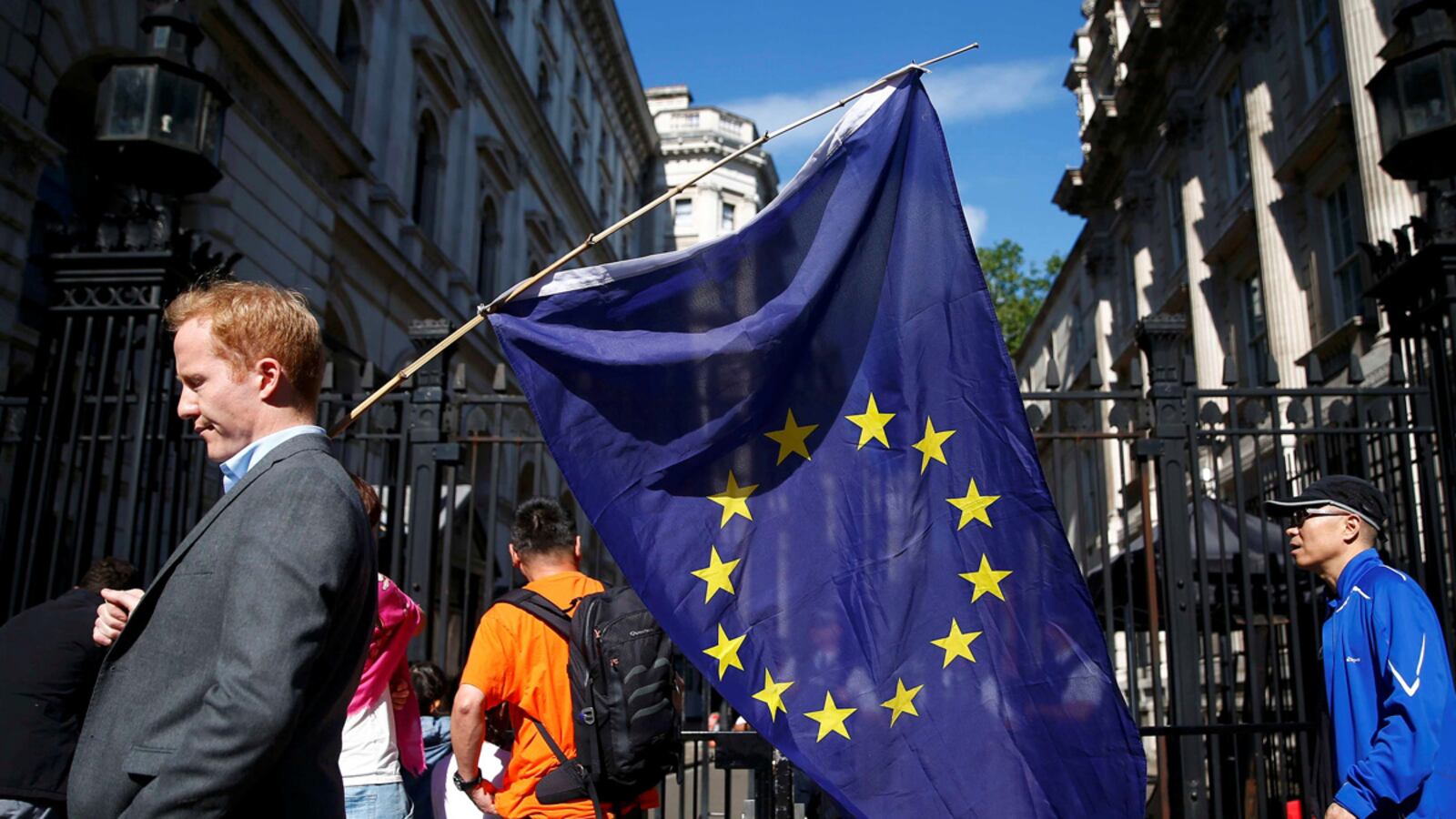For the past 35 years I’ve traveled as a journalist through the broken, impoverished back roads of globalization, from Mexico to Egypt, from Ecuador to Central America to Bulgaria to American Indian country, where the free trade wisdom of the political and investment class has brought precious little wealth, or even “stability,” whatever that means, to ordinary people on the ground.
And so I am more than a little skeptical of the simplistic explanation that pro-Brexit voters were simply racist old people with no regard for their grandchildren. Like rust-belt refugees in the U.S., these people obviously saw nothing beneficial coming from the disastrous trade and debt agreements, from NAFTA to the Greek and Spanish austerity arrangements, so smugly promoted by the likes of Blair, Cameron, Merkel and the Clintons.
Sure, racist and xenophobic fear-mongering, echoing Donald Trump’s presidential campaign, played a significant role in Brexit. And yes, the vote provides a dangerous opening for xenophobic political movements in Europe and the U.S.
But far less understood is the legitimate fury of voters who are sick of being ignored and patronized by false promises of free trade and global integration. Commentaries decrying the ignorant commoner who failed to take heed of the “the opinions of economists and business leaders” assume that such advice was somehow worth heeding.
Based on my three-plus decades navigating the flotsam of globalization, I see little evidence for that.
In 1990, a free trade evangelist in the U.S. embassy in Tegucigalpa assured me that George Bush the Elder’s “Enterprise for the Americas” would lower trade barriers, bring jobs to Central Americans and facilitate cheap exports like melons and shrimp to the U.S.
Who cashed in? Well-connected Honduran military strongmen, who bulldozed precious mangroves in the Gulf of Fonseca, threatened local fisherman, and stripped them of their traditional fishing grounds. But because this U.S.-funded project privatized the fishing commons, and sent untold tons of shrimp to North American plates, it was a “success.”
Another alleged free trade victory: the thousands of “maquiladora” factories that sprouted in the 1980s and ‘90s at the northern edge of Mexico, where hungry young peasants flocked north for $5-a-day jobs assembling jeans, chain saws, false teeth, garage door openers, and TVs, all to be sent back to the U.S.
The workers I met, in Nogales an hour south of Tucson, lived mostly in crude dwellings fashioned from the cardboard boxes and wooden pallets shipped from the U.S. These young workers weren’t allowed to organize. Their factories’ safety standards were nil. (I interviewed a 15-year-old who’d lost a finger on the job.) And some of their U.S. employers dumped toxic chemicals with impunity. But this “success” would soon beget another one.
In 1993, President Bill Clinton expanded the maquiladora model to all of Mexico, championing NAFTA as a way to “create an economic order in the world that will promote more growth, more equality, better preservation of the environment, and a greater possibility of world peace.”
What we got instead were tens of thousands more unemployed American workers, collapsing Mexican maize prices from a market flooded by U.S. corn, a sharp rise in hunger and rural poverty in Mexico, and an opening, a generation later, for a billionaire demagogue to hammer another would-be President Clinton.
I interviewed some of the Mexican free trade refugees, many of whom had arrived at the U.S. border determined to cross over for a better life. In many cases, the people I’ve talked to are politically aware and able to trace their circumstances to economic policies in distant capitals. But elsewhere the economic forces are so remote as to be incomprehensible.
In the Dominican Republic, I met Haitians paid a dollar for every ton of sugarcane stalks they cut. The young man sleeping on a bed of leaves had little notion that his labor contributed to a sugar import quota in the U.S. And the old Navajo woman living in a mud hogan, without electricity or running water, did not know that the springs to water her sheep had run dry so that operators of the nearby multinational coal mine could crush the fuel into a liquid slurry and transport it hundreds of miles underground to a power plant in Nevada.
This assignment, one of my first, in the early 1980s, would foreshadow dozens that followed: the transfer of resources from a Third World-like Navajo country, as part of a grand resource strategy designed in boardrooms thousands of miles away.
Across the globe, free trade export strategy is often sold as a way for poorer nations to earn dollars to provide for their citizens. But in fact the money often comes right back to service growing foreign debt. Over several trips to Ecuador in the 1990s and in 2001, I witnessed the environmental and social devastation to the country’s Amazon region from an oil industry overseen by Texaco and the state-run oil company, Petroecuador. Vast networks of roads and pipelines cut deep into pristine rainforest. Hundreds, perhaps thousands of oil spills poisoned local waters, forcing some indigenous tribes downriver, across the border into Colombia.
Yet in 2001, Ecuador doubled down, literally, doubling its production capacity through an export pipeline financed by foreign banks. The pipeline’s path ran through a lush, sensitive cloud forest. As with the previous boom, benefits for Ecuadorans would prove scarce. After the banks, oil service companies, and their investors took their substantial cut, 80 percent of the remaining petrodollars were earmarked to pay off Ecuador’s soaring external debt.
Hand in glove with expanded global trade come austerity measures sanctioned and imposed by the U.S., EU, the IMF and the World Bank. Politicians and business leaders market them as the inevitable cost of joining (or remaining part of) the global economy.
Who benefits? Distant investors, principally, who never feel the pain faced by families. Yet from my own travels I’ve learned that such “belt-tightening” is a euphemism for massive job cuts, shuttered hospitals and kindergartens, skyrocketing bus fares, and the gutting of maternal leave, child benefits, subsidies for milk and bread: in short, the things that made life tolerable for poor and working people everywhere. It’s no wonder that austerity is linked with increased suicide rates, especially among women.
In some places, such economic upheaval is suffered silently. I recall watching elderly Bulgarians, who grew up thinking that Communism would take care of them in retirement, sifting through dumpsters in a new economic regime. In the countryside, old people lost all of their pensions; their modest dreams to spend a week each year at a Black Sea cottage long gone, they couldn’t even afford to leave their villages, ever.
But often, of course, austerity is met with protest and violence. I witnessed the Amman “bread riots,” when angry young men took to the streets of Jordan’s capital. They were furious that their king’s government had capitulated to Jordan’s IMF masters, who demanded an end to affordable bread for the country’s poor. More recently, anti-austerity protests erupted across Europe, including in Greece, Italy, Ireland, Portugal and the U.K., where in 2010 students rallied against 80 percent cuts in higher education. New protests in the UK erupted over austerity cuts this April—further proof that the current anger over globalization comes from the left as well as the right.
So it should hardly be a surprise that the “opinions of economists and business leaders” weren’t near the top of Brexit voters’ concerns. For these voters — for generations of Europeans cheated by investor-friendly austerity — indeed for the sugarcane cutter sleeping on a bed of leaves, the old Navajo woman living beneath the power lines that don’t connect to her home, and the old Bulgarian trapped forever in her own village — there’s no logic in listening to the so-called wisdom of the political and financial elite.
The Brexit vote is not therefore something to be understood in isolation, or simply in tandem with Donald Trump’s hyper-nationalistic success. That this sour turn of events benefits the oblivious Trump, who seems to care more about his golf courses than the fate of Europe, is not just ironic. More important, it is a comment on how deeply out of touch and disregarding the leaders of the current economic order have been to the millions of voters in Britain, America, and beyond, now taking revenge behind the voter’s curtain.
How useful it would be if even one of the architects of globalization took a shred of responsibility for the neoliberal disaster they have created, and advocated a more inclusive vision based on fair trade and reducing the pain of austerity. Failure to do so runs the risk that the anti-trade anger will fuel only the nativists and xenophobes on the right. Better, as Bernie Sanders urged this week, “to make clear that we stand with those who are struggling and who are left behind.”






